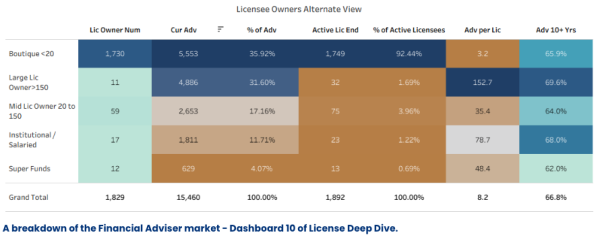Actuaries propose ‘guidance’ as advice missing link

The Actuaries Institute is canvassing the need for legislative backing for a new advice tier ‘guidance’ which will sit between general and holistic advice.
The institute has issued a discussion paper which canvasses the role of ‘guidance’ which would entail “direction, tailored nudges based on consumer circumstances (e.g., fund prompts, risk alerts. Required defined boundaries and safeguards but not the full rigour of personal advice”.
The discussion paper has suggested a framework of Help, Guidance and Advice, noting that it establishes “a continuum of financial support options, providing clarity on what can be offered under each category:
- Help: Provision of factual information, tools and calculators to support understanding. No personalisation, minimal regulatory burden.
- Guidance: Directional, tailored nudges based on consumer circumstances (e.g., fund prompts, risk alerts). Requires defined boundaries and safeguards but not the full rigour of personal advice.
- Advice: Personalised, professional recommendations that consider the individual’s financial situation and objectives. Subject to existing professional and regulatory standards.
The discussion paper notes that Government reforms will be essential beyond the implementation of the Delivering Better Financial Outcomes package, with the HFA proposal critical to increasing access to affordable HGA “with superannuation funds playing a pivotal role alongside financial advisers, other financial institutions and digital solutions.
However, it said a broader framework would need to accommodate the change.
“Current regulation tends to treat all advice as equally complex, failing to distinguish between simple guidance and comprehensive planning. Many consumers require support varying from Help to Guidance to different levels of Advice complexity – each serves a distinctive purpose,” the discussion paper said.
“Currently operating in regulatory grey areas, Guidance bridges factual information and personalised advice. It enables scalable, cost-effective support for the millions who need more than basic help but less than comprehensive advice.
“Superannuation fund trustees face a tension between their obligation to support members (including Retirement Income Covenant requirements to ‘identify and recognise broad retirement income needs’) and complex financial advice regulations. The HGA framework, supported by DBFO reforms, provides a pathway to resolve this ‘Trustee Dilemma ’while enabling funds to better serve their members,” it said.
Commenting on the discussion paper, the chair of the Institute’s HGA Working Group, Andrew Gale said the proposal would ensure people had access to basic financial facts through guidance and suggestions on retirement goals, as well as comprehensive personal advice on a range of issues.
“Middle Australia stands to benefit most because comprehensive personal advice is out of reach for many, but help, guidance and specific purpose simple advice at pivotal moments would significantly improve their financial wellbeing,” he said.
“Our framework provides the architecture that will enable millions of people of all ages to receive support in different levels of complexity and that fits their individual needs.”











Call it “NOT Advice, Generic Sales Prompts” maybe it would be clearer to the consumer.
General advice as it is usually provided steps beyond these points anyway. I am surprised that anyone other than ASIC doesn’t already know this. A better alternative would be fixing the cluster …. that is the provision of personalised advice in Australia.
And Real Advisers remain strangled to death with mass BS over regulation.
Hot Mess Jones only increased the hot mess and costs. Triple ASIC levy, Life Ins Comms Optin required, Fee Consent that still requires 2 seperate forms, fee consents that had to be redone for 8 mths of this year and of course CSLR levies that could be Billions.
Grate job Hot Mess, what a clown show he was and Canberra remains.
The problem with just two types of advice, general and personal, is that the client does not understand the difference. Clients see “Information” as advice, and in their terms it always means it’s just about them i.e. personal advice
Now the actuaries, who clearly don’t have enough to do, have come up with a middle position. I wonder if they asked any advisers for their comments or did they just talk to the superfunds. And do the actuaries have a conflict because they derive income from industry superfunds, and the life insurers who hope to jump on the same “General advice” bandwagon?
No amount of bureaucratic BS is going to take away the problem that the client will always think they are being provided with personal advice despite the best intentions of the adviser. That’s the trap and I can see the ambulance chasing lawyers lining up to sue advisers who trip across boundaries. How long before the next Royal commission
To paraphrase the comments of a judge in a case against CBA some years ago (Couper), where a CBA planner handed over responsibility for the SOA to a paraplanner and then sort to deny responsibility for the advice while replacing a product, the client will always see an adviser as an “expert” and therefore the client has grounds to believe that the adviser has a fidicuary duty to act in the best interests of that client, having garnered full knowledge of that client’s particular, individual, personal situation, whether overtly or covertly.
Personal advice should be the main aim of the advice industry and any fringe dwellers, like the superfunds. That’s what the client thinks he’s getting and that’s what a reasonable person could argue they should expect..But we all know what this DBFO is about – assisting the industry superfunds to retain FUM post-retirement,and help life insurers keep disgruntled policyholders on the books while flogging crap products direct
That’s not to say there is not a need for ASIC to give ground on compliance surrounding personal advice. A 35 page SOA should not be required to sell someone $1 million worth of life cover.
Dear old Risky,
First off, I am now retired but in response to your commentary, I will qualify my remarks.
I once held a position in sales management of a major life company and was invited by the old LUA to lecture life agents on Disability Income insurance.
Some considered me knowledgeable.
In fact, I sold risk insurance for some of my agents, but it was a different ballgame back in the 1980’s.
I then went back to get further education at university twice whilst becoming a financial planner with a CFP designation.
But here’s the thing,
You and I know through over-regulation today, not only if you are only giving advice on Life Insurance at the request of the client, the regulator also (ASIC) expects you to discuss in detail that you had a reasonable basis for your recommendation and what else you considered in the way of risk advice and why, because you are expected to anticipate what impact that advice could have on the client over the next 30+ years.
That’s why you need to complete a 35-page SOA for $1m worth of life cover, and if you don’t, ASIC will have your freckle in a sling.
I’m just a relevant provider, not Qualifed Adviser of course but have we thought about making personal face to face advice with a human being as complex and over regulated as phyically possible? Perhaps maybe make the entire process like 3-5 appointments at a minimum and we could drown these sources in red tape. I believe that process would really help people get Advice via Tik Tok. If more people are getting advice via Tik Tok and joining the 600,000 Australians that got scammed last year surely that is a a more efficent way of addressing questions?
I do believe people also really like to get Advice over the phone or chat function on a website, by staff capped at talking for 5 minutes that is talking to at least 20 other retiree’s on the chat function at the same time. So we really need to encourage people onto those channels too.